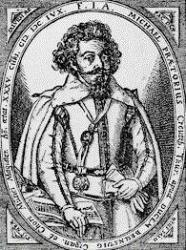- |
User Links
Benjamin Praetorius

| Short Name: | Benjamin Praetorius |
| Full Name: | Praetorius, Benjamin |
| Birth Year: | 1636 |
| Death Year: | 1674 |
Prätorius, Benjamin, son of Andreas Prätorius, pastor at Obergreieslau near Weissenfels in Saxony, was born at Obergreisslau, January 1, 1636. In 1637. his father was appointed pastor at Gross-Lissa near Delitzsch, in Saxony. Benjamin became a student of theology, and giaduated M.A., probably at Leipzig. In the entry of his marriage in the registers of Gross-Lista, for 1657, he is described as "regularly ordained substitute and future successor of this parish": and he is never described in the registers except as Pastor-substitute. His ninth child was born in 1671, and on Jan. 8, 1675, his son Andreas Benjamin, on acting as godfather, is described as “surviving son" of M. Benjamin Prätorius. It is probable that he died some time in 1674, but as the register of deaths of this period is lost, we are unable to fix the exact date (K. Goedeke's Grundriss, vol. iii., 1887, p. 176; manuscript from Pastor Moebius of Gross-Lissa, &c).
According to Wetzel, ii., 314, he was crowned as a poet on Feb. 15, 1661. In the registers for 1663 he first designs himself "poëta Caes." and "Kais. gekrönter Poëta" (i.e. imperial crowned poet), and in 1670 as "poëta Caes. laur. coronatus." His hymns appeared in his (1) Jauchtzendes Libanon, Leipzig, 1659, and (2) Spielende Myrten-Aue, Leipzig, 1663. In the preface to the latter he signs himself as "C. P. Caes. und Diener am Wort daselbst" (minister of the Word), under date “Gross-Lissa, Dec. 24, 1663."
The only hymn by him translated into English is:—
Sei getreu bis an das Ende. The Reward of the Faithful. In 1659, as above, No. 64, p. 15?, in 9 stanzas of 8 lines, and founded on Rev. ii. 10. In full in the Unverfälschter Liedersegen, 1851, No. 339. It is also often found as "Sei getreu in deinem Leiden," as in the Berlin Geistliche Lieder, ed. 1863, No. 749. This is from Luppius' sGesang-Buch, Wesel, 1692, p. 22, where it is in 7 stanzas (iv., ii., iii., v., ix., i. and a new stanza which begins, "So wohlan, so will ich leiden"), and is erroneously ascribed to J. C. Schade. The original form is tr. as:—
Be thou faithful to the end, Let not. By Miss Warner, in her Hymns of the Church Militant, 1858, p. 362, repeated as No. 255, in Bishop Ryle's Collection, 1860. [Rev. James Mearns, M.A.]
--John Julian, Dictionary of Hymnology (1907)
| Texts by Benjamin Praetorius (10) | As | Authority Languages | Instances |
|---|---|---|---|
| Be thou ever true to Jesus | Benjamin Praetorius (Author) | English | 1 |
| Lass es, Jesu, dich erbarmen | Benjamin Praetorius (Author) | German | 4 |
| Leo shangwe zitolewe | Benjamin Praetorius (Author) | Swahili | 2 |
| Sei getreu bis an das Ende, dau're redlich aus den Kampf | Benjamin Praetorius (Author) | German | 25 |
| Sei getreu bis an das Ende, damit keine Qual und Not | Benjamin Praetorius (Author) | German | 7 |
| Sei getreu bis an das Ende, das nicht Marter, Angst und Not | Benjamin Praetorius (Author) | German | 25 |
| Sei getreu bis an das Ende, ringe durch den Kamp dich los | Benjamin Praetorius (Author) | German | 2 |
| Sei getreu in deinem Leiden | Benjamin Praetorius (Author) | German | 22 |
| Triumph, Triumph es kommt mit Pracht | Benjamin Praetorius (Author) | German | 12 |
| Vær i korset tro og stille | Benjamin Praetorius (Author) | Norwegian | 5 |


 My Starred Hymns
My Starred Hymns


